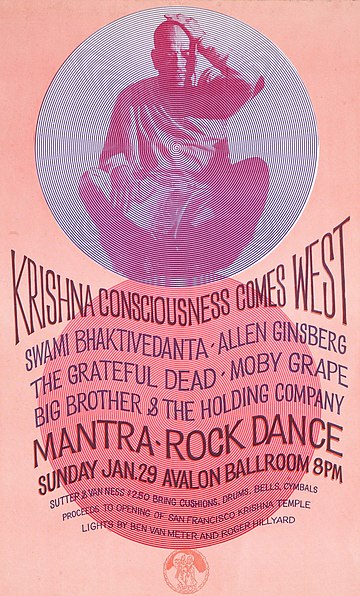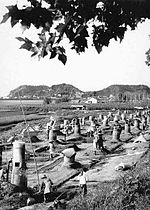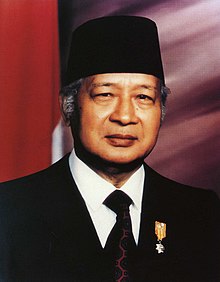Portal:1960s
The 1960s Portal
The 1960s became synonymous with the new, radical, and subversive events and trends of the period. In Africa the 1960s was a period of radical political change as 32 countries gained independence from their European colonial rulers. Some commentators have seen in this era a classical Jungian nightmare cycle, where a rigid culture, unable to contain the demands for greater individual freedom, broke free of the social constraints of the previous age through extreme deviation from the norm. Christopher Booker charts the rise, success, fall/nightmare and explosion in the London scene of the 1960s. However, this alone does not explain the mass nature of the phenomenon. Several nations such as the U.S., France, Germany and Britain turned to the left in the early and mid 1960s. In the United States, John F. Kennedy, a Keynesian and staunch anti-communist, pushed for social reforms. His assassination in 1963 was a stunning shock. Liberal reforms were finally passed under Lyndon B. Johnson including civil rights for African Americans and healthcare for the elderly and the poor. Despite his large-scale Great Society programs, Johnson was increasingly reviled by the New Left at home and abroad. The heavy-handed American role in the Vietnam War outraged student protestors across the globe, as they found peasant rebellion typified by Ho Chi Minh and Che Guevara more appealing. Italy formed its first left-of-center government in March 1962 with a coalition of Christian Democrats, Social Democrats, and moderate Republicans. Socialists joined the ruling block in December 1963. In Britain, the Labour Party gained power in 1964. In Brazil, João Goulart became president after Jânio Quadros resigned. This is a Featured article, which represents some of the best content on English Wikipedia..
The Voting Rights Act of 1965 is a landmark piece of federal legislation in the United States that prohibits racial discrimination in voting. It was signed into law by President Lyndon B. Johnson during the height of the civil rights movement on August 6, 1965, and Congress later amended the Act five times to expand its protections. Designed to enforce the voting rights protected by the Fourteenth and Fifteenth Amendments to the United States Constitution, the Act sought to secure the right to vote for racial minorities throughout the country, especially in the South. According to the U.S. Department of Justice, the Act is considered to be the most effective piece of federal civil rights legislation ever enacted in the country. The National Archives and Records Administration stated: "The Voting Rights Act of 1965 was the most significant statutory change in the relationship between the federal and state governments in the area of voting since the Reconstruction period following the Civil War". The act contains numerous provisions that regulate elections. The act's "general provisions" provide nationwide protections for voting rights. Section 2 is a general provision that prohibits state and local government from imposing any voting rule that "results in the denial or abridgement of the right of any citizen to vote on account of race or color" or membership in a language minority group. Other general provisions specifically outlaw literacy tests and similar devices that were historically used to disenfranchise racial minorities. The act also contains "special provisions" that apply to only certain jurisdictions. A core special provision is the Section 5 preclearance requirement, which prohibited certain jurisdictions from implementing any change affecting voting without first receiving confirmation from the U.S. attorney general or the U.S. District Court for D.C. that the change does not discriminate against protected minorities. Another special provision requires jurisdictions containing significant language minority populations to provide bilingual ballots and other election materials. (Full article...)This is a Good article, an article that meets a core set of high editorial standards.
The Partial Test Ban Treaty (PTBT), formally known as the 1963 Treaty Banning Nuclear Weapon Tests in the Atmosphere, in Outer Space and Under Water, prohibited all test detonations of nuclear weapons except for those conducted underground. It is also abbreviated as the Limited Test Ban Treaty (LTBT) and Nuclear Test Ban Treaty (NTBT), though the latter may also refer to the Comprehensive Nuclear-Test-Ban Treaty (CTBT), which succeeded the PTBT for ratifying parties. Negotiations initially focused on a comprehensive ban, but that was abandoned because of technical questions surrounding the detection of underground tests and Soviet concerns over the intrusiveness of proposed verification methods. The impetus for the test ban was provided by rising public anxiety over the magnitude of nuclear tests, particularly tests of new thermonuclear weapons (hydrogen bombs), and the resulting nuclear fallout. A test ban was also seen as a means of slowing nuclear proliferation and the nuclear arms race. Though the PTBT did not halt proliferation or the arms race, its enactment did coincide with a substantial decline in the concentration of radioactive particles in the atmosphere. (Full article...)Selected picture - The Mantra-Rock Dance musical event took place on January 29, 1967, at the Avalon Ballroom in San Francisco and came to be dubbed as the "ultimate high" and the "major spiritual event" of the hippie era. It was organized by the early followers of the Hare Krishna movement as a promotional and fundraising effort for their first temple on the West Coast. One of them, Harvey W. Cohen, created the Stanley Mouse inspired promotional poster (pictured). The Mantra-Rock Dance featured the Hare Krishna founder Bhaktivedanta Swami, the countercultural ideologues Allen Ginsberg and Timothy Leary, and leading rock groups the Grateful Dead, Moby Grape, and Janis Joplin with Big Brother and the Holding Company. The event caused the Hare Krishna mantra to be adopted by all levels of the counterculture as a "loose commonality" and a viable alternative to drugs.
Did you know -
Related portalsThis is a Featured article, which represents some of the best content on English Wikipedia..
Sir Richard Starkey MBE (born 7 July 1940), known professionally as Ringo Starr, is an English musician, songwriter and actor who achieved international fame as the drummer for the Beatles. Starr occasionally sang lead vocals with the group, usually for one song on each album, including "Yellow Submarine" and "With a Little Help from My Friends". He also wrote and sang the Beatles songs "Don't Pass Me By" and "Octopus's Garden", and is credited as a co-writer of four others. Starr was afflicted by life-threatening illnesses during childhood, with periods of prolonged hospitalisation. As a teenager Starr became interested in the UK skiffle craze and developed a fervent admiration for the genre. In 1957, he co-founded his first band, the Eddie Clayton Skiffle Group, which earned several prestigious local bookings before the fad succumbed to American rock and roll around early 1958. When the Beatles formed in 1960, Starr was a member of another Liverpool group, Rory Storm and the Hurricanes. After achieving moderate success in the UK and Hamburg, he quit the Hurricanes when he was asked to join the Beatles in August 1962, replacing Pete Best. (Full article...)This is a Good article, an article that meets a core set of high editorial standards.
Suharto (/suːˈhɑːrtoʊ/ soo-HAR-toh, Indonesian: [suˈharto] ; 8 June 1921 – 27 January 2008) was an Indonesian military officer and politician, who served as the second and the longest serving President of Indonesia. Widely regarded as a military dictator by international observers, Suharto led Indonesia as an authoritarian regime from the fall of his predecessor Sukarno in 1967 until his resignation in 1998 following nationwide unrest. His 31-year dictatorship is considered one of the most brutal and corrupt of the 20th century, as he was central to the perpetration of mass killings against alleged communists, ethnic Chinese, irreligious people and trade unionists. Suharto was born in the small village of Kemusuk, in the Godean area near the city of Yogyakarta, during the Dutch colonial era. He grew up in humble circumstances. His Javanese Muslim parents divorced not long after his birth, and he lived with foster parents for much of his childhood. During the Japanese occupation era, Suharto served in the Japanese-organized Indonesian security forces. During Indonesia's independence struggle, he joined the newly formed Indonesian Army. There, Suharto rose to the rank of major general some time after full Indonesian independence was achieved. (Full article...)Selected article -The Cultural Revolution, formally known as the Great Proletarian Cultural Revolution, was a sociopolitical movement in the People's Republic of China (PRC). It was launched by Mao Zedong in 1966 and lasted until his death in 1976. Its stated goal was to preserve Chinese communism by purging remnants of capitalist and traditional elements from Chinese society. Though it failed to achieve its main objectives, the Cultural Revolution marked the effective return of Mao to the center of power in China after his political sidelining, in the aftermath of the Great Leap Forward and the Great Chinese Famine. In May 1966, with the help of the Cultural Revolution Group, Mao launched the Revolution and said that bourgeois elements had infiltrated the government and society with the aim of restoring capitalism. Mao called on young people to bombard the headquarters, and proclaimed that "to rebel is justified". Mass upheaval began in Beijing with Red August in 1966. Many young people, mainly students, responded by forming cadres of Red Guards throughout the country. A selection of Mao's sayings were compiled into the Little Red Book, which became revered within his cult of personality. In 1967, emboldened radicals began seizing power from local governments and party branches, establishing new revolutionary committees in their place. These committees often split into rival factions, precipitating armed clashes among the radicals. After the fall of Lin Biao in 1971, the Gang of Four became influential in 1972, and the Revolution continued until Mao's death in 1976, soon followed by the arrest of the Gang of Four. (Full article...)More Did you know (auto generated)
TopicsCategoriesWikiProjects
Associated WikimediaThe following Wikimedia Foundation sister projects provide more on this subject:
Discover Wikipedia using portals |





























